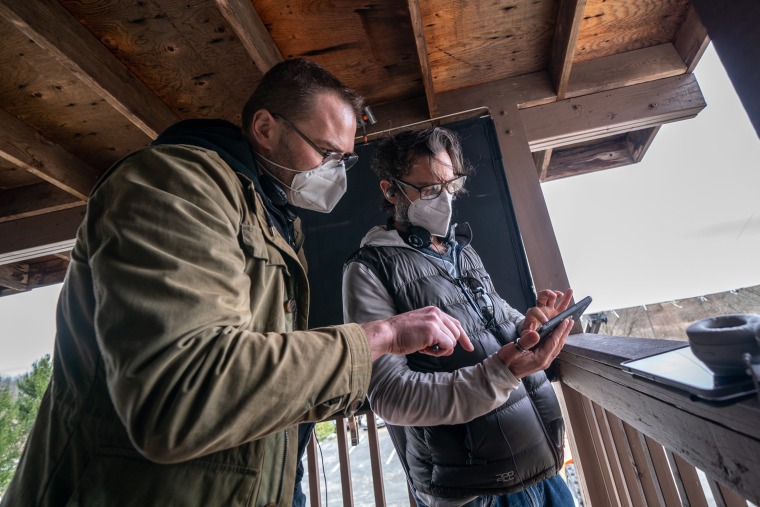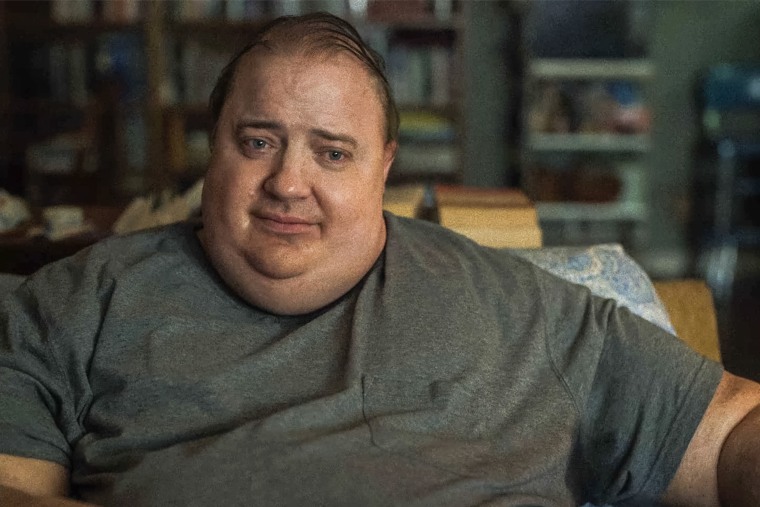“The Whale,” a character study about a 600-pound homebound teacher seeking connection and redemption, is finally getting its silver screen debut, but the film’s source material has been part of playwright-turned-screenwriter Samuel D. Hunter’s life for more than a decade.
When Hunter first started writing the award-winning play that the film is based on back in 2009, he said he wasn’t seeing “earnest, heart-on-your-sleeves storytelling” in off-Broadway theaters at the time.
“So when I wrote it, I was like, this is so unfashionable, I really doubt it’s going to do anything, maybe it’s just for me, maybe this was more like therapy for me more than anything else, but I wrote it because I really wanted to,” he said of “The Whale” play, which debuted in Denver in early 2012 before heading to off-Broadway later that year.
Hunter proved himself terribly wrong. His tale of Charlie — a gay, obese, reclusive English professor who attempts to reconnect with his estranged daughter as he nears the end of his life — received praise from theater critics and audiences alike.
“‘The Whale’ was seminal for me, both in my career but also, kind of, for me personally. It was the first time that I had … really personal stuff from my own history and put it into a play,” Hunter said.
The story is set in Moscow, Idaho, where Hunter grew up, and, like Charlie, Hunter said he, too, had a fraught relationship with religious fundamentalism and self-medicated his depression with food.
In addition to Charlie’s redemption arc with his daughter, “The Whale” also centralizes his grief, as he mourns the loss of his late partner, Alan, whose death contributes to Charlie’s binge eating and weight gain.
“It just affected people in a different way than my other plays had,” he added, saying his willingness to put something on the line where the audience can “sense a vulnerability” allowed them to more easily “open their hearts and minds” and have a meaningful theater experience.
After being recognized with several awards, including a GLAAD Media Award and a Drama Desk award, the play caught the attention of filmmaker Darren Aronofsky (“Black Swan,” “Mother!,” “Requiem for a Dream”), who had attended one of the performances in November 2012 at the Playwrights Horizons in New York City.
“I hadn’t even known that Darren came and saw it,” Hunter said. “I just got a call that Darren wants to meet with you and talk about film rights, and I came into the meeting with almost zero expectations.”
When the two first met, nearly a decade ago, Aronofsky was in the midst of post-production on his 2014 biblical epic “Noah,” starring Russell Crowe and Jennifer Connelly, and Hunter had no screenwriting experience. During that initial meeting, the two men started to lay the groundwork for a film adaptation. “After that meeting, I just kind of assumed that Darren would want to do that more traditional thing of like, opening it up, and like adding characters, adding locations, flashbacks or what have you,” Hunter recalled.

They eventually settled on keeping the story solely set in Charlie’s apartment, with the supporting players in his orbit coming in and out the front door, just a few feet away from the couch he barely leaves — even as he virtually teaches his college English course.
Seven years after that first meeting, around 2019, Hunter and Aronofsky were still trying to bring the project to life, but they hadn’t found Charlie — or an actor willing and able to don the controversial fat suit.
“I thought the project was dead,” Hunter said. “I was like, ‘There’s no way this is gonna happen.’ And then, all of a sudden, I get a phone call from Darren, and he says, ‘What about Brendan Fraser?’”
Around 2018, Fraser was slowly returning to film following a long hiatus from the public eye and had recently been seen in shows including “The Affair,” “Condor” and “Titans.”
“Darren rented a theater, and we did a reading of the screenplay, as one would do, like a reading of a play, just so we could hear Brendan in it,” Hunter recalled.
After seeing Fraser bring Charlie to life through the reading, Hunter said, he finally thought the stars were aligning — but life took an unexpected turn in early 2020.
“I think, ‘At long last, we found the guy who can actually do this, and he’s telling the story the right way — with love, integrity, this uncanny ability to hold joy and despair in the same moment.’ And then, 10 days later, the pandemic hit,” Hunter said.
During much of the pandemic, the cast still ran rehearsals virtually, though the project eventually had to be put on hold. In March 2021, however, things picked back up again.
In addition to Fraser as the film’s lead, Sadie Sink was cast to play Charlie’s angsty and rebellious teenage daughter, Ellie, who wants nothing to do with her father. Hong Chau was cast as Alan’s sister, Liz, who happens to be a nurse and cares for the homebound Charlie after her brother’s death.
“Darren said on day one that we’re a theater company, and we dug into it as you would dig into a text. He blocked it like you would block a play with the exception of like, we weren’t playing everything to an audience,” he said. “But it really allowed us to get to know one another.”
As the film adaptation of “The Whale” hits U.S. theaters, Hunter said he hopes audiences empathize with the screenplay’s exploration of how trauma — especially the type rooted in homophobia from religious institutions — can harm people and break them down.
Like the film’s main character, Hunter said he, too, experienced religious trauma as a queer person.
“One of the reasons that I fell into depression and self-medicated with food for as long as I did, was that I thought I had left it all behind,” he said. “I’m out of the closet, I’m fine now, but that masks a lot of stuff that I just had not processed. I think it’s worth talking about.”
While “The Whale” deals with heavy subject matter, Hunter said it’s still a hopeful film.
“There’s a lot that happens in this movie, but I think in the end, it’s about a person who has unwavering faith in the goodness of other people,” he said. “Despite everything he’s been through, he’s not a cynical person at all.”
